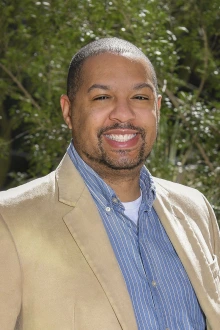Society Honors Dr. Michael Johnson for Diversity Promotion
The American Society of Microbiologists (ASM) has honored Michael D.L. Johnson, PhD, with its William A. Hinton Award for Advancement of a Diverse Community of Microbiologists for his creation of the National Summer Undergraduate Research Project (NSURP).
“I’m very honored,” Dr. Johnson said. “Doing the summer program was definitely not one of those things you do to get an award. It’s more something you do to help the community at large. But it’s a nice recognition that this program is beneficial to the scientific community.”

Dr. Michael D.L. Johnson
The program started in June 2020 as a way to create a “virtual matchmaking program” to pair underrepresented minority students with microbiology labs to promote research experience during the COVID-19 pandemic. It gained momentum quickly and grew to more than 250 students and 170 volunteer mentors worldwide for that first eight-week summer session. According to a paper in Nature Microbiology, 54% were first-generation college students and about 53% were Black, 44% were Latinx and 3% were Native American.
“A lot of people were missing out on in-person summer research. People were canceling them because of the pandemic. This was affecting underrepresented minorities the most,” Dr. Johnson said. “So, what I did was start a virtual summer research program.”
With funding from the UArizona Office for Research, Innovation and Impact and a Provost Award for Innovation in Teaching, as well as several grants from the National Science Foundation for nearly $275,000 specifically to offer student stipends, NSURP’s second year this past summer was more targeted with 66 full-time paid students and 64 mentors. The number of UArizona participants in NSURP included six students and five mentors in 2020 and three students and four mentors in 2021. Seminars, projects and presentations available online illustrate the quality of work completed.
The ASM award recognizes outstanding contributions toward fostering research training of minorities and increasing diversity in microbiology. It is given in memory of William A. Hinton, a pathologist and public health pioneer, and the first Black scientist to join ASM and the first Black professor in the history of Harvard University. He developed the Hinton test for syphilis, which became the standard procedure due to its ease of use, cost-effectiveness and accuracy compared to earlier tests.
Even as in-person summer programs resume, more than 30% of initial participants said they couldn’t attend in-person programs due to various obligations. Dr. Johnson plans to continue NSURP to meet the needs of Latinx and BIPOC (Black, Indigenous and people of color) students. He called the virtual delivery mode the “most important and biggest thing” about the program.
“This is because they may be taking care of loved ones (their parents or children) during the summer and so don’t have the opportunity to travel for a program like this. In that respect, this program bridges the gap and allows them access into the scientific research community,” he said.
NSURP continues to seek any research projects tangential to microbiology and immunology where it can match underrepresented students with mentors. Mentors don’t need to be faculty, Dr. Johnson stressed, they can include graduate trainees, postdoctoral fellows and staff scientists.
“Underrepresented minorities continue to need allies and this program is an excellent opportunity for people to help them and show that they are allies. If they’re able to mentor a student, we’re always looking for mentors.”
Related UArizona Health Sciences stories:
“A Virtual Bridge to Grad School Built During the Pandemic” (4/12/21)
“Dr. Michael Johnson Recognized as Inspiring Black Scientist” (5/25/21)

